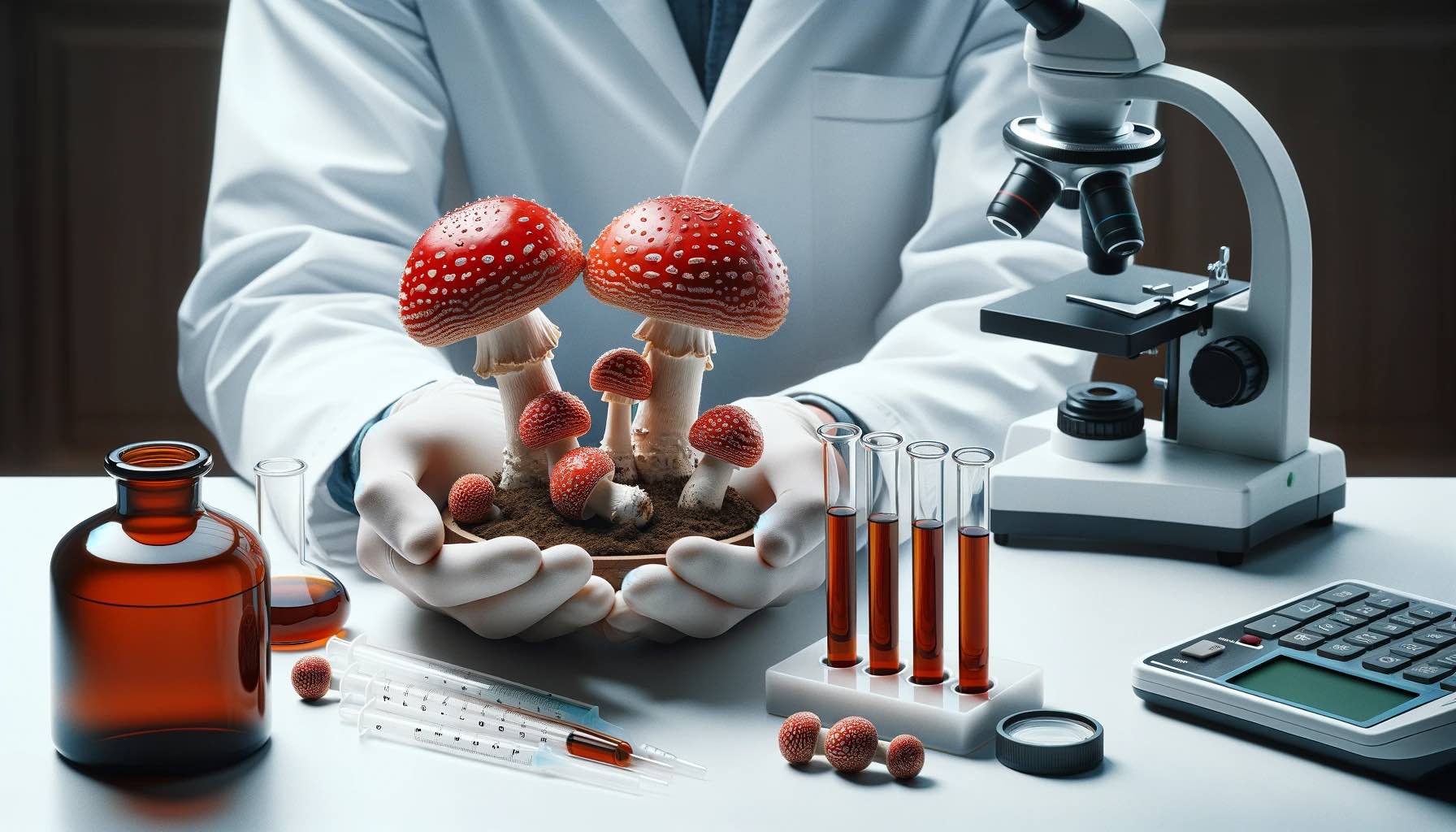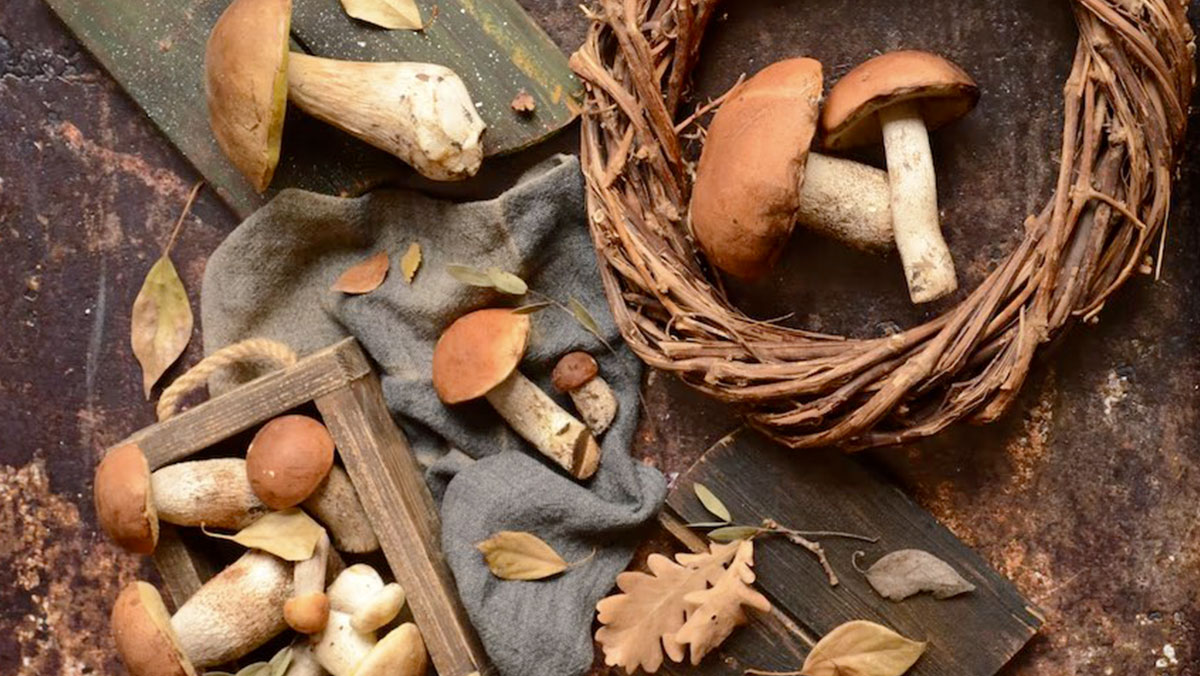Ibotenic Acid in Amanita Muscaria: Effects, Safety, and Legality
Ibotenic Acid in Amanita Muscaria: Effects, Safety, and Legality
- Amanita Muscaria Active Compounds
- Historical Usage
- Chemical Structure of Ibotenic Acid
- Ibotenic Acid vs. Other Psychoactive Substances
- Pharmacology
- From Ibotenic Acid to Muscimol
- Psychoactive Doses & Duration
- Safety Concerns
- Current Research and Therapeutic Potential
- Legal Status
- Bottom Line
Amanita muscaria, also known as the Fly Agaric, is the iconic red-capped, white-dotted mushroom that appears everywhere, from fairy tales to video games. Cultures have harnessed it as an intoxicating substance in religious rituals due to its hallucinogenic properties and used it as a traditional medicine. People have also recently explored its therapeutic potential for anxiety, muscular pain, and restorative sleep.
One of Amanita muscaria’s primary compounds is ibotenic acid, an organic alkaloid with psychoactive and potentially toxic properties in high doses.
This article investigates ibotenic acid, shedding light on its effects, pharmacological mechanisms, research, potency testing, and safety concerns.
Amanita Muscaria Active Compounds
Amanita muscaria mushrooms contain many alkaloids, or naturally occurring active compounds containing nitrogen as their base. Alkaloids have diverse and impactful physiological effects on humans and other animals. Amanita’s main known psychoactive alkaloids are ibotenic acid and muscimol.
Ibotenic acid serves as the principal alkaloid in the mushroom, with concentrations ranging from 0.3 to 1.0 grams per kilogram of dry weight. When ingested, it undergoes decarboxylation in the body, losing its molecule’s carboxyl group to form muscimol.
Muscimol is the compound most responsible for Amanita muscaria’s psychoactive effects once ingested. Chemically, muscimol is a potent agonist (activator) of GABA, a brain neurotransmitter known for calming effects that likely plays a significant role in controlling body functions like mood, anxiety, and sleep.
Ibotenic acid, the precursor of muscimol, resembles a different brain neurotransmitter, glutamic acid (glutamate). Unlike GABA, glutamate has more stimulating effects. Ibotenic is a potent neurotoxin at high levels. For this reason, manufacturers should look to convert most ibotenic acid into muscimol before ingestion.
Illustrating this point further, payment processor Evergreen Payments Northwest told ACS Laboratory they would only approve merchants who can prove their product contains less than 20mg ibotenic acid per serving. Merchants must confirm this quantity through a third-party laboratory Certificate of Analysis.
When ACS asked Evergreen where that number came from, they didn’t know. For this reason education and transparency is more important than ever.
Historical Usage
As a historical note, indigenous European tribes consumed Fly Agaric mushrooms and embraced ibotenic acid’s intoxicating and inebriating effects. Reports show that Siberian clans enjoyed the state of feeling ‘drunk,’ especially before the introduction of alcohol.
Typically, those who consumed substantial Amanita doses knew they might lose consciousness. However, upon awakening, they often experienced blissful effects from the body’s conversion of ibotenic acid into muscimol.
Chemical Structure of Ibotenic Acid
Ibotenic acid belongs to a class of organic compounds known as l-alpha-amino acids. These are alpha amino acids with the L-configuration of the alpha-carbon atom.
- L-amino acids are the molecules used to produce proteins in the human body, and they occur in all proteins made by animals (including humans), plants, bacteria, and fungi.
- Amino acids participate directly and indirectly in many essential biochemical functions in the brain.
- Research shows they connect to processes like fear, learning, and memory.
Need a Test or Have a Question
Ibotenic Acid vs. Other Psychoactive Substances
Ibotenic acid is very different from classic psychedelic compounds like psilocybin.
- Psilocybin found in traditional magic mushrooms interacts with serotonin receptors (5-HT2A), playing a pivotal role in cognitive functions, including memory processing and mood. Its profound serotonin action impacts all the senses and alters a person's thinking, sense of time, and emotions. Hallucinations and musical experiences are also common with psilocybin use.
- Ibotenic Acid, on the other hand, contributes to Amanita muscaria’s dissociative and deliriant effects by reducing (or blocking) chemical signals to the conscious mind. Deliriants are a subclass of dissociatives that induce a state of delirium characterized by confusion, disorientation, and detachment from reality.
Pharmacology
Ibotenic acid typically affects receptor sites in the central nervous system. Specifically, it activates glutamate and interacts with NDMA receptors related to how the body acquires information. Glutamate is the most abundant excitatory neurotransmitter (chemical messenger) released by nerve cells in the brain. An excitatory neurotransmitter excites or stimulates a nerve cell.
- When ibotenic acid activates glutamate, it accelerates chemical messages moving from nerve cell to nerve cell without stopping. This effect classifies ibotenic acid as an excitotoxin.
- Excitotoxins are a class of chemicals (usually amino acids) that overstimulate neuron receptors.
Neuron receptors allow brain cells to communicate with each other. However, when exposed to excitotoxins, they can fire impulses so rapidly that they become exhausted. As a result, ibotenic acid can have relatively powerful neurotoxic effects.
Ibotenic acid’s adverse effects include agitation, confusion, motor depression, and ataxia (lack of coordination).
From Ibotenic Acid to Muscimol
When someone ingests Amanita mushrooms, a portion of the ibotenic acid metabolizes into muscimol. However, the safest way to consume Amanita muscaria mushrooms is by ingesting those that have been dried or via extract or isolate-based products where the ibotenic acid has been converted into muscimol via a proprietary decarboxylation mechanism.
Decarboxylation is the key process involved. This process can be facilitated by applying heat or using a catalyst, often an acid or a base. The aim is to yield muscimol while minimizing the presence of unconverted ibotenic acid.
Some processes might use solvents or other reagents to facilitate the reaction or to purify the resultant muscimol. Once converted, the product often undergoes further purification to ensure purity and remove residual ibotenic acid, catalysts, or solvents.
The resulting high-muscimol and low-ibotenic acid doses contribute to:
- Euphoria and tranquility
- Drowsiness
- A dream-like or lucid state of mind
- Out-of-body experiences
- Changes to sensory perception
- Vivid dreams
Psychoactive Doses & Duration
Compared to ibotenic acid, muscimol is a much more potent psychoactive agent.
Muscimol has a psychoactive dose of 10-15 mg, while ibotenic works at 50-100 mg. Thus, muscimol is about ten times stronger.
For these high-dose experiences, peak intoxication usually occurs about two to three hours after ingestion and generally lasts six to eight hours.
Safety Concerns
Consuming numerous fresh, whole Amanita Muscaria or Amanita Pantherina can be poisonous and extremely dangerous, depending on ibotenic acid levels and ratio to muscimol.
- In fresh samples, the ibotenic acid to muscimol ratio in an Amanita muscaria’s fungal cap tissue is about 9 to 1 or greater.
- While lower in dried samples, ibotenic acid often still exceeds muscimol at a ratio of 3 to 2.
When mushrooms contain too much ibotenic acid, the body can’t successfully convert it into muscimol. High ibotenic acid levels, along with another toxic Amanita compound (muscarine), can cause:
- Sweating
- Nausea
- Cramps
- Loss of balance
- Involuntary bodily movements
- Bizarre cognitive and perceptual changes
Consumers should only buy extracts and dried Amanita products from sellers that conduct third-party testing for alkaloid potency. The lab test report, known as a Certificate of Analysis, should show a high muscimol to ibotenic acid ratio.
Current Research and Therapeutic Potential
Amanita muscaria has been used recreationally and medicinally for thousands of years among tribal groups in Scandinavia, Eastern Europe, and Russia. However, most recent studies focus on muscimol benefits due to ibotenic acid’s potential adverse effects.
Modern medicinal chemistry and research back up traditional uses, finding that muscimol can help with various mental and physical health issues, such as:
- Treating stress and anxiety
- Easing muscular pain
- Promoting restorative sleep
- Reducing insomnia
- Memory-protecting activities
- Helping with addiction
Studies on muscimol are in the early stages but show promising results, including:
- Reduces inflammation: A 2022 animal study showed muscimol could protect against systemic inflammatory responses, highlighting the compound's potential anti-inflammatory effects.
- Protects memory: Research on muscimol indicates Amanita muscaria could benefit brain health, treating symptoms associated with Huntington's Disease and Alzheimer's.
- Fights disease: A study on the potential antioxidant properties of muscimol shows it has possible applications in a broad range of health conditions.
Legal Status
Amanita muscaria is legal in most of the world, thanks to the absence of psilocybin and psilocin. The ibotenic acid and muscimol compounds in A. muscaria are mainly unregulated.
United States
In the United States, ibotenic acid and muscimol are not on the DEA’s drug scheduling list, making ibotenic acid federally legal to possess.
The FDA has not approved Amanita for human consumption. However, many brands, such as Psilomart, Psyched Wellness and Awakening Roots legally sell A. muscaria and muscimol extracts online. MN Nice Botanicals produces an Amanita muscaria microdose spray where 100% of the ibotenic acid has been converted to muscimol certified by ACS Laboratory’s testing analysis.
At the state level, only Louisiana regulates Amanita muscaria under Louisiana State Act 159. This law bans possessing and cultivating Amanita muscaria mushrooms and outlaws preparations intended for human consumption.
International perspectives
Along with the United States, many countries don’t have restrictions on Amanita muscaria and its active ingredients. For instance, in 2022, Health Canada designated Amanita muscaria as a natural health product in fresh or dried form.
However, some countries have banned the deliriant mushroom due to its toxic potential and psychoactivity. Countries that outlaw Amanita muscaria include:
- Australia (Australian law lists muscimol as a scheduled drug under its Poisons Standard)
- The Netherlands (amounts exceeding 5 grams fresh or 0.5 grams dried can result in criminal charges)
- Thailand
- Russia
Bottom Line
Ibotenic acid is abundant in fresh Amanita mushrooms. Its neurotoxic qualities can result in adverse effects like nausea, cramps, and confusion. At the same time, ibotenic acid is the precursor to muscimol, the well-tolerated and primary psychoactive compound in Amanita muscaria. Manufacturers that convert ibotenic acid to muscimol in extracts and isolates mitigate safety risks, offering products focusing on Amanita muscaria’s therapeutic potential to help with stress, pain, and sleep.
Need a Test or Have a Question
ACS Laboratory is a leader in entheogen testing, including Amanita muscaria and Amanita pantherina mushrooms. Brands aiming to ensure safety and potency should contact us today for a full panel Amanita test.








.png)
.png)
.png)
.png)
.png)